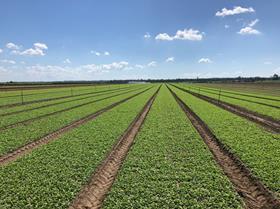
Leading Harvest in partnership with Mutual Trust has announced a new pilot that will bring the organisation’s universal agriculture sustainability standard to Australia.
The pilot will provide growers and agriculture customers with a universal certification through Leading Harvest’s ‘Farmland Management Standard’, which standardises sustainability verification and reporting across the industry, resolving inefficiencies faced by farmers, producers, and customers in providing sustainability assurances.
The Australian programme is being facilitated by multi-family office Mutual Trust, and already includes inaugural participants with more than 420,000ha of farming across the country, including horticulture operations.
Kenny Fahey, president and chief executive of Leading Harvest, said the pilot would establish a Farmland Management Standard unique to Australia that reflects the agronomic, regulatory, and operating realities of the region following the model pioneered in the US.
“There is a pressing need in Australia’s agriculture industry for a standardised, sector-wide certification for sustainability. Leading Harvest’s innovative Farmland Management Standard was developed globally for this purpose - to harmonise sustainability reporting across the agriculture sector,” explained Fahey.
“The launch of our Australian pilot programme is an exciting step forward for Australia’s agricultural industry, and will show that a harmonised, third-party audited approach to sustainability can unlock more value for the farming community.”
The pilot follows a successful 20-month proof of concept in the US where Leading Harvest enrolled 526,000ha representing 90 different crop types in various regions across the country. Fahey said the demand for this solution was just as strong in Australia.
“In Australia, the demand for products that are produced sustainably is high and continuing to grow, and the industry is crying out for a standardised approach that will allow sustainable farming practices to become integral,” Fahey said.
“The need is evident on the customer side too, with 87 per cent of Australian consumers saying they are more likely to purchase products that are ethically and sustainably produced. We look forward to creating a Farmland Management Standard unique to the Australian market and we’re confident that the demand for an industry-wide certification like ours will be as strong in Queensland as it is in California.”
Inaugural pilot programme participants include Manulife Investment Management Agriculture Services (Australia), Canada’s Public Sector Pension Investment Board (PSP Investments), Renewable Resource Group Capital Management, Warakirri Asset Management and Affiliate Members Accounting for Nature and Kilter Rural.
Fruit, vegetable and nut operations are well represented across the participants with the likes of Renewable Resource Group involved in the production of table grapes and nuts in Victoria and NSW.
Warakirri Asset Management represents a number of funds including Warakirri Diversified Agriculture Fund. Its assets include long-term tenant partnerships with three fresh produce sector leaders – Costa Group, Moora Citrus and Dicky Bill Australia plus Drinan Farms, which produces soft leaf vegetables in Victoria.
Meanwhile, Manulife Investment Management agriculture portfolio in Australia includes almond production and PSP Investments is a joint venture partner in leading nut producer Stahmann Webster.
The Farmland Management Standard focuses on positive outcomes, as opposed to prescribing methods to achieve results. It aims to achieve 13 principles: sustainable agriculture; soil health and conservation; protection of water resources; protection of crops; energy use, air quality and climate change; waste and material management; conservation of biodiversity; protection of special sites; local communities; employees and farm labour; legal and regulatory compliance; management review and continual improvement; and tenant-operated operations.
By empowering farmers, landowners, and managers to determine the best method to achieve a desired outcome, the Standard encourages innovation and new operational efficiencies that can be adapted one crop row to the next, or one farm field to another.
The pilot programme is anticipated to be completed within eight months, with Leading Harvest collaborating with local stakeholders and agricultural representatives to ensure the alignment between the principles of the Standard and the practical realities of farming in Australia.
Leading Harvest said it intends to formally launch the Standard in Australia when the pilot concludes, making it widely available to growers and land managers across the continent.



